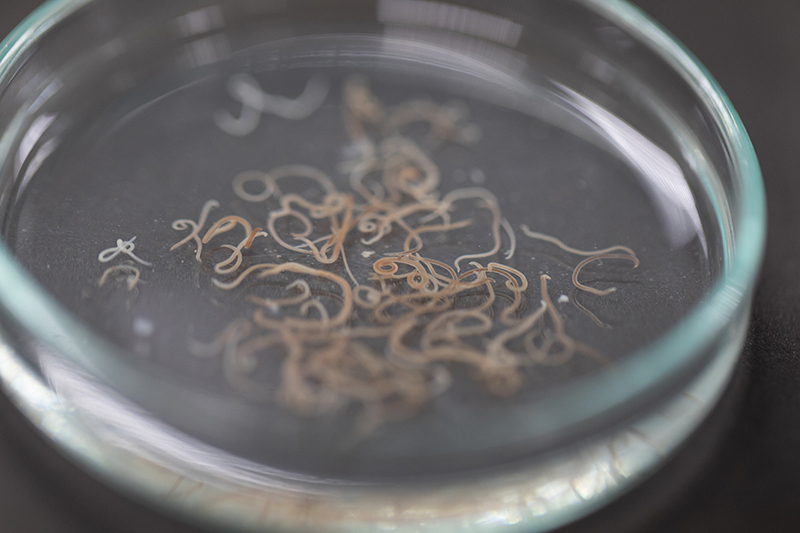Tests
Stool-PCR Parasites
The Parasite Multiplex PCR Test, a PCR analysis technique based on stool samples

Efficient diagnosis and targeted treatment of intestinal parasites with our Multiplex PCR test
Our Parasite Multiplex PCR test provides a qualitative in vitro test for the simple or multiple detection of the 16 most common species of intestinal parasites - intestinal helminths (worms) and intestinal protozoa.
With this qualitative in vitro test, it is possible to diagnose parasite infections efficiently, leading to improved patient care. Through the precise detection of various parasite species, suitable treatment strategies can be developed and targeted therapy initiated. Our technology offers a cost-effective and time-saving solution for the diagnosis of intestinal parasites, contributing to more effective infection control and improved health management.
The Parasite Multiplex PCR Test is the only one of its kind worldwide. It is represented by two tests that can be conducted independently of each other
Multiplex PCR for Intestinal Protozoa
Giardia lamblia, Entamoeba histolytica, Cryptosporidium spp., Blastocytis hominis, Dientamoeba fragilis, Cyclospora cayetanensis
Multiplex PCR for Intestinal Helminths (worms)
Ancylostoma spp., Ascaris spp., Enterobius vermicularis, Hymenolepis spp., Enterocytozoon spp./Encephalitozoon spp., Necator americanus, Strongyloides spp., Taenia spp., Trichuris trichiura
Accuracy = ≥ 99.9%, detection limit was 100 copies/reaction
Fast processing and easy sample handling - optimized for the detection of parasites in stool, which does not need to be frozen and does not require large amounts of material - you will receive the result 3-7 days after receipt of the sample
To maintain the higher standard and quality of the test, each sample has a positive and negative control
Fair price – can be integrated into our daily laboratory routine thanks to a standardized test procedure
Clear, actionable laboratory results - if you have any questions, we will be happy to help you interpret the results and the significance of individual parasite species
Peer-reviewed scientific articles describe the analytical validation of a direct competitive PCR assay for the detection of various intestinal parasites in human stool
Information about parasites
Parasites are organisms that live on or in another organism, the host, and depend on it for their survival. Parasites come in many different forms, including worms, protozoa and insects. Some parasites are harmless, while others can cause serious health problems. They can enter the human body through contaminated food or water, insect bites or even through the skin.
Some parasites, such as malaria, are a common cause of death, while others, such as parasitic nematodes, can cause disfigurement, blindness and severe economic problems. A recent World Health Organization (WHO) report on the leading causes of death worldwide shows that one third of all deaths are due to infectious diseases and parasites. It is estimated that between 1.5 and 2.7 million people die each year from malaria, which is about the same as the number of deaths caused by HIV/AIDS (World Health Report 1998, WHO).
There are several types of parasites that can infest the human body:
Tapeworms: These flat, segmented worms can grow up to 10 meters long and live in the intestines, causing symptoms such as abdominal pain, diarrhea and weight loss.
Roundworms: These long, thin worms can grow up to 15 cm long and live in the intestines. They cause symptoms such as coughing, wheezing and abdominal pain.
Giardia: This parasite is one of several single-celled organisms that can cause diarrhea, abdominal pain and weight loss.
Characteristics of Human Parasites
The symptoms of a parasitic infection can vary depending on the type of parasite and its location in the body. Some common symptoms include:
- Abdominal pain
- Diarrhea
- Nausea and vomiting
- Fatigue
- Weight loss
- Itching or irritation
- Fever
Prevention
The best prevention against parasitic infections is good hygiene, such as regular hand washing, thorough cooking of food, and avoiding contaminated water. It is also important to avoid contact with insects and animals that can transmit parasites.
Recommended Testing
Since parasites can affect more than just the intestines, we recommend antibody testing for the specific pathogen in case of suspected parasitosis.
